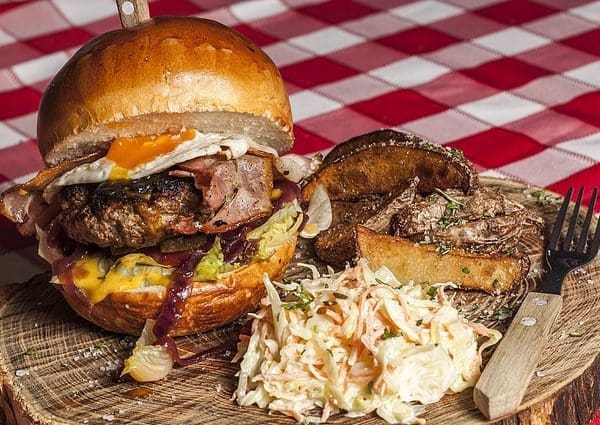When Hubby was first diagnosed, we asked about diet and exercise. “That’s like closing the barn door after the horse has gotten out,” said one oncologist (not the oncologist we ended up hiring).
One urologist said, “I heard lycopene is good for prostate cancer, and tomatoes have lycopene, so you might want to eat more tomatoes.”
“Good,” said Hubby out of earshot of the doctor. “I’ll add more tomatoes to my Big Macs and I’ll be just fine.”
Photo credit: Pixabay
And so, Hubby and I were left to our own devices as a newly-diagnosed couple.
My first step was to veto Hubby’s more-tomatoes-on-my-Big-Mac plan.
We then slogged through a profusion of nutrition info on the web. All-juice diets. Dairy-free diets. Meat-free diets. Week-long cleansing fasts. Coffee enemas.
With all the conflicting reports, what information can a person believe?
A couple years later, after I got a job at our local cancer center, I learned that what we decided at the beginning of the journey turned out to be a good thing. We went with a common-sense diet that would be good for most people — whether dealing with cancer, diabetes, heart disease or obesity.
We basically:
a) increased our fruits and veggies, whole grains and legumes;
b) eliminated unhealthy fats and sugars. I even experimented with a whole wheat, dark chocolate chip cookie sweetened with Fruit Sweet. Hubby gave it two thumbs up … but Hubby would give anything that contained chocolate two thumbs up;
c) ate mostly poultry and seafood as our meats (is seafood a meat?!).
That simple.
Here are a few misconceptions about nutrition that Hubby and I encountered along the way:
1. Eating the right foods will cure your cancer. “It was not diet that caused the cancer,” says Jill Souto-Maier, Registered Dietitian Nutritionist (RDN) at the St. Charles Cancer Center in Bend, Oregon, “so diet won’t cure it.” But diet can certainly help the patient be healthier for fighting cancer. “We know from research that a balanced, plant-rich diet is the best diet [for people with no allergies or food sensitivities]. But that doesn’t mean you can’t have a treat.” Jill says to include foods from all food groups—don’t eliminate any food groups—and rather than eating a large piece of meat with your meal, incorporate smaller portions for flavoring.
2. When it comes to nutrition advice, one size fits all. Um, no. Patients on treatment are different from patients losing weight from muscle loss. Are different from patients who have completed treatment. Are different from … (you get the idea).
a) Patients on treatment need to stay nourished and try to keep their weight up. “If they become malnourished and their bodies go into survival mode, it’s hard for them to tolerate treatment,” says Jill. When everything tasted metallic to Hubby while on chemo, the foods he wanted were ice cream, pudding, and pasta with homemade white sauces. I asked Jill at work: “What can I fix that will taste good to him but is healthier than what he wants?” Jill interrupted me. “Marlys,” she said in a rather bossy emphatic tone. “Gary. Can. Eat. Whatever. He. Wants.” Well, OK then.
b) At a time when Hubby was losing weight from muscle loss and his PSA count was rising, we happened to watch the documentary Forks Over Knives. It was compelling. These two grandfatherly doctors explained how meats and dairy and eggs make us sick. It wouldn’t hurt for Hubby to try a vegan diet for a few months, right? Absolutely not, said Carol, the cancer center RD at the time. She explained how our muscles need protein. Protein can be found in plant foods, of course, but eggs and cheese and meat have leucine that plant foods don’t have. And aging muscles need leucine. Particularly aging muscles dealing with cancer.
c) After cancer treatment, Jill recommends a plant-rich diet. “There’s a place for meat and protein,” she says. “Especially if you’ve had treatment and you need to rebuild cells.” Jill purports the 90/10 rule – 90 per cent of the time, eat healthfully. And have that occasional treat.
3. Sugar feeds cancer cells, so you should eliminate sugars. In Hubby’s early days of diagnosis, we heard this statement. Oh great. I’ve been slowly killing my husband with homemade chocolate chip cookies. But Jill explained that whatever you feed your body is also going to feed cancer. “You can’t starve yourself to starve cancer. Our bodies need the complex sugars, fiber and B vitamins that are in fruits and whole grains.” Jill explained that you can eat foods with sugars that won’t cause an insulin spike. “It’s the insulin spike from eating carbohydrates (sugars) in excess that is harmful because insulin is a growth factor.”
4. Eating meat can cause cancer. The American Institute for Cancer Research qualifies this statement: “Red meat contains proteins and important nutrients, including B vitamins, iron and zinc. The AICR finds that eating 18 ounces or less of red meat weekly is not associated with a notable increase in colorectal cancer risk. Risk increases with higher consumption.”
Regarding processed meats—meats preserved by smoking, curing or salting (or with the addition of chemical preservatives), such as bacon, sausage and hot dogs—AICR recommends avoiding them altogether or eating them in limited amounts on special occasions.
5. All nutrition advice on the web and in magazines is reliable. Now that’s funny. Check out the Oncology Nutrition Dietetic Practice Group website for tips on how to find reliable nutrition resources. Here are a couple of ‘red flags’ from ONDPG when deciding the validity of nutrition information. Be careful if:
a) A product promises a quick fix
b) There are dire warnings on the package
c) An article lists ‘good’ and ‘bad’ foods
d) Recommendations are based on a single study
e) If it sounds too good to be true
6. Any nutritionist can advise on a cancer diet. There are good nutritionists in the community who can coach people toward better eating and, therefore, better health. But a cancer patient needs counsel from someone who is trained in medical nutrition therapy and preferably an RDN who has experience working with the cancer community. Jill used the example of a particular cancer medication that needs to be followed up by folic acid recovery. Oncology specialized RDNs know the various meds, how a patient will likely react to them, and what they need to eat for recovery.
Hubby lived ten years with Stage IV cancer. That’s eight years longer than projected by the experts. Ten good quality years.
If our change in diet had nothing to do with the longer years—and I strongly suspect it did—then certainly it had a good deal to do with the quality of Hubby’s life in those years.
How about you? Cancer or not, do you need to incorporate healthier foods into your diet? Would feeling better be worth it? I’m thinking yes.
P.S. If you found this post helpful or inspirational, please share, tweet or post!


Celina
<3 I love this!
Marlys Johnson
thanks, Celina!